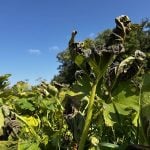Rather than killing independent canola variety testing, the collapse of this year’s tests appears to be boosting the demand to make them bigger and better.
Variety developers and farmers say widespread farmer outrage proves that the tests are wanted and worthwhile.
“We appreciate the growers’ reaction to this situation because it demonstrates to us in a very tangible way how important this information is to growers,” said Garth Hodges, the head of canola variety development for Bayer CropScience.
Read Also

Trade war may create Canadian economic opportunities
Canada’s current tariff woes could open chances for long-term economic growth and a stronger Canadian economy, consultant says — It’s happened before.
“In the past, we may have just guessed that this information may have been important to growers. We now as an industry know resoundingly that this information is important to growers.”
Interviews with grower groups, variety developers and the Canola Council of Canada establish that the collapse of this year’s trials came after years of working to develop an improved system and the hope that this year would bring a new system on-line.
Variety developers generally felt the current system of small plot trials only revealed the genetic potential of tested varieties, not their likely performance in various production systems. Many developers wanted bigger, more commercially applicable tests done, but companies couldn’t agree on the makeup of a new regime.
The canola council brought developers together in the fall to try to find a consensus, but an agreement couldn’t be reached.
Before the deadline for companies to submit their varieties, the companies were informed that no substantial changes were planned because consensus couldn’t be reached. A number of frustrated developers chose to hold back from entering the trials.
With few varieties to test, the council decided the trials weren’t worth conducting and dropped the tests for the year.
A number of variety developers were surprised at the sudden cancellation.
“We were caught a little bit un-awares,” Hodges said.
Bayer, which supported keeping the small plots and adding larger commercial tests, hopes that can be established for 2011. Hodges said the final design can be a work-in-progress next year, but developers including his company would like to see new tests added so a new model can be tested.
“For us, it’s not a case of either or. For us, it was a case that we were willing to participate in both,” said Hodges. “We want to work with all stakeholders to make sure that farmers have access to good agronomic data to enable them to make good business decisions.”















